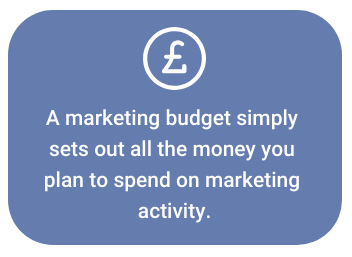How to get the best from your marketing budgetA guide to help you successfully allocate your marketing spend
Guide
Defining your marketing budget can be tricky, especially as a small business
Our guide aims to help you successfully allocate your marketing spend, whilst having the flexibility to react and respond to changing circumstances.
What exactly is a marketing budget?
Let’s start with the basics. A marketing budget simply sets out all the money you plan to spend on marketing activity. Some businesses do this for a year at a time, others on a quarterly or monthly basis, the choice is yours.

Your budget needs to show what your marketing goals are and how much you intend to spend to achieve them. Break it down into the different activities and channels you plan on using, such as paid advertising, marketing staff or consultants, email campaigns, direct mail, leaflets and flyers, websites or incentives. Your budget should also show how many times you intend to carry out each activity and how much you expect each to cost.
What is important to remember however is that plans can, and often should, change. Building in a degree of flexibility allows you to do what small businesses do best – adapt. Whether it’s to changing trends, audience appetite or the environment we find ourselves in.
How much should my marketing be?
The answer to that question will likely vary from business to business. There is no magic formula unfortunately. Factors such as the size, long and short term goals, budgets and availability of funds will inevitably affect the budget you and your business is working with in complex ways.
According to this breakdown B2B Marketing Budget – Build a Budget Strategy for 2024, companies in the B2B space should be allocating 10% of their revenue towards marketing. You could consider spending half of this on traditional B2B marketing including direct mail and half on digital marketing, including social media and email. A good proportion of current digital spend implies Ads which tends to mean LinkedIn and Google.
According to research by Alba SEO Services, 38% of small businesses asked spent less than £1,000 on marketing each year, another 38% spent between £1,000-£5,000, while 5% spent between £5,000-£10,000 and 14% spent more than £10,000.1
According to research conducted on behalf of Experian the average spend on all new business B2B Marketing is £108k. £52k of this was spend on Email marketing in line with expectations of this channels effectiveness, £28k was spend on tele-marketing and £22k on direct mail. Direct Mail is significantly more common among larger businesses indicating the relative cost and complexity of that method, smaller businesses are less likely to focus on a range of techniques that require additional budget.
How can I calculate my marketing budget?
Any previous marketing activity is a good place to start. If you’re not already keeping track of how much you spend and how effective each campaign was, it’s vital that you do. The more information you can gather, the better decisions you can make about repeating or amending your activity. For example, if you spent £250 on a Facebook Ad campaign that generated only a handful of low quality leads, but you know that your regular emails result in a 200% return on investment, it’s much easier to see where you should focus your future marketing efforts.
To calculate your budget, take your gross (or estimated) revenue, decide on a percentage spend (somewhere between 6-20% depending on the size, scale and longevity of your business). Take this total figure and break it down further to create an allocation for each of your planned marketing activities, using data from previous campaigns to help you.
Your budget doesn’t have to be a consistent amount for each month of the year. If you know you’re going to have seasonal peaks and troughs, then plan your budget accordingly – spending more ahead of peak sales periods and easing off in your quieter times.
What should I spend my budget on?
To an extent, this will depend on your industry, on what you’re selling and who your customers are. What works for one company won’t necessarily work for another. As a small business, getting the best value for your marketing spend is critical and you are the experts in your customers – who they are, what makes them tick and what they’re looking for. Consider getting support your research if this is too time consuming. Companies such as Experian have specialist products and services designed to identify, describe and enhance your understanding of the businesses you already call customers. They can also use that learning to find many more prospects that fit the same profile.
Don’t limit yourself to just one channel but instead build a cross-platform plan that takes advantage of the best ones for you. As well as looking at current marketing trends to see if they can be adapted to use in your own business, it’s vital to assess the environment around you – as the past few months have shown. Many businesses that previously relied on high-street footfall have had to adapt and respond with a plan more focussed towards online sales.
Here are some suggestions of what you could invest marketing budget in this year:
1. Email marketing
The popularity of Email Marketing continues to grow. According to the the DMA Email Benchmarking Report 2024, volumes reached 381 billion in 2023, which is a record high since they began tracking in 2016. This growth can be explained, perhaps, by the move to hybrid working and GenAI technology advancements making it more and more easy to generate content. Emails are a great way to drive quick revenue when needed but you must take care not to overdo it. You risk wasting a lot of time and effort if your email lacks personalisation and spamming your targets too often can easily result in potential customer going cold on your business.
The advance of GenAI have allowed us to capture insight and characteristics of businesses appearing in services like BusinessView on a larger scale than ever before. This insight allows personalisation at scale on relatively tight marketing budgets, which are currently at a post pandemic low according to Gartner.
Once you’ve targeted the right people, you need to deliver your message effectively. Your emails must have great subject lines, engaging content, strong calls to action and a clear, attractive design. If this isn’t your thing, then outsourcing it is marketing budget well spent. Our Email Broadcasting service offers support when it comes to making your email campaign successful, with guidance on everything from design through to delivery. Contact us to find out more.
2. Social media
This is an obvious way to market your business online and it’s something you can do yourself, although the landscape changes very quickly and it can be very time consuming. If you don’t have the budget to outsource your social media to an expert, try committing to just one or two platforms that will be the most relevant to your business and make sure you engage with them regularly. For example, if you’re a photographer, you’re more likely to see success on a visual platform like Instagram rather than a text-based one like Facebook or X. The key to social is consistency. Post regularly and again, think about how your audience will receive it when you’re creating content.
3. Content marketing
This has been popular for several years and for good reason. This approach focuses on creating valuable, relevant content that attracts and retains your audience, with the aim of driving sales for you. According to the Content Marketing Institute, research consistently shows that a documented content strategy is often an indicator of content marketing success, with more B2B marketers documenting their strategies than ever before.2
Video is an essential part of any content marketing strategy. YouTube now has more than 2 billion active monthly users worldwide3 and according to Animoto, 93% of brands got a new customer because of a video they posted on social media.4 You can use video across all digital platforms and global forecasts suggest that the average person will watch 84 minutes of online video a day, up from 67 minutes in 2018.5
When it comes to blogging, more than 77% of internet users say they read blogs at least once a month and websites with a blog tend to have 434% more indexed pages6 than those without. Blogs are a quick and easy way to regularly update your website’s content, as well as providing your customers with valuable insights into your company’s ethos. What’s more, articles with images get up to 94% more views that those that don’t include any.7
4. Search Engine Optimisation (SEO)
SEO is another key marketing activity that can’t be ignored. Allocating some budget to increase your visibility in search is vital to remaining competitive and attracting your target market. According to Hubspot, 64% of marketers actively invest in SEO8, however if it isn’t currently part of your marketing plan this guide from smallbusiness.co.uk is a good place to start.
5. Pay Per Click (PPC)
PPC is a great way to drive quality traffic to your website. PPC is a method of bidding for placement on a search results page, like an auction for search engines. One of the advantages is that it’s very flexible and can be tailored according to your budget and seasonal promotions. According to research by Search Engine Land, three quarters of people said paid search ads made it easier for them to find the information they were searching for.9 Many people use Google AdWords as a starting point and it’s worth experimenting with, to see if it can generate valuable leads for your business.
6. Conversion tools
Conversion tools are simple ways to start generating leads or customers from your website and their use is set to grow even further amongst small business owners in 2020 and beyond. Whether you want to capture leads on your site, curate the latest research and information on your industry, create a landing page for a new offer or product, or write brilliant emails, there are loads of tools to help you do it. Check out this list by Hubspot for some inspiration.
If you’re a small business owner, there’s no doubt that making a plan for your marketing can really pay off. Investing time in planning at the beginning of the year can help you to be more efficient with spend and maximise your campaigns chance of success.
Pay attention to current trends, but don’t get too bogged down by them. Remember that you’re the expert in both your business and audience, meaning you’re best placed to know what will attract their attention. Focus on finding the best value for your marketing budget and invest in what works well.
Finally, don’t be afraid to make changes. If you can see that something isn’t working as effectively as you’d hoped for – adapt it, change it or park it and move on. Being flexible is one of the greatest benefits of being a small business, so use it to your advantage.
How can we help?
BusinessView is your go-to platform for finding high quality company contacts. With a database of over five million companies and hundreds of searchable variables and attributes, you can find the best prospects to fuel your marketing and sales campaigns as trusted by 1,000 businesses.
- SME Digital Marketing Trends in the UK in 2019, AlbaSEO
- 2020 B2B Research, Content Marketing Institute
- YouTube Statistics, Oberlo
- Top Business Video Trends, Animoto
- Online Video Consumption Continues to Rise Globally, Marketing Charts
- 63+ Blogging Statistics from 2023, Web Tribunal
- 6 Powerful Reasons Why You Should Include Images in Your Marketing – Infographic, jeffbullas.com
- Marketing Statistics Every Team Needs to Grow in 2025, Hubspot
- What makes people click on search ads?, Search Engine Land











